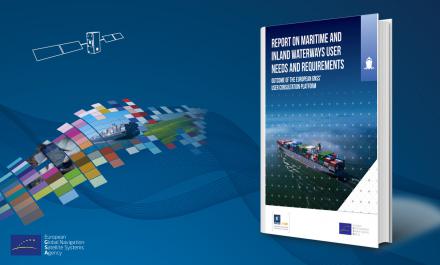The European GNSS Agency (GSA) recently published a Report on Maritime and Inland Waterways User Needs and Requirements as part of a series of eight similar reports examining user needs and requirements for position, navigation and timing (PNT) solutions. These reports will help shape the discussion at the next EGNSS User Consultation Platform (UCP), to be held as part of European Space Week in Marseille on 3-4 December 2018.
In the maritime and inland waterways (IWW) domains,  GNSS is used for both navigation and positioning and it has become the primary means of navigation in many maritime and IWW applications. The GSA report provides an overview of GNSS-enabled maritime and IWW applications, sheds light on the current market and technology trends and outlines the key user requirements for GNSS, covering the most important market and technology trends of the sector, the main market players and the main user groups.
GNSS is used for both navigation and positioning and it has become the primary means of navigation in many maritime and IWW applications. The GSA report provides an overview of GNSS-enabled maritime and IWW applications, sheds light on the current market and technology trends and outlines the key user requirements for GNSS, covering the most important market and technology trends of the sector, the main market players and the main user groups.
Watch this: EGNOS and Galileo for Waterborne Transport
Regulation and standards
Even though GNSS has gained widespread acceptance as the preferred positioning system for a majority of maritime applications, no existing GNSS is capable of meeting all operational requirements, especially integrity, without the use of augmentation systems including SBAS. However, the report notes that to consolidate the permanent and widespread use of SBAS, it will be necessary to have specific regulation concerning maritime users’ needs.
Indeed, with the notable exception of recreational navigation, regulation has a strong role in defining user requirements and represents a key driver for the adoption of new solutions for navigation and positioning, including satellite-based systems and services. Given the international scope of the maritime sector, the report notes that agreement and mutual understanding is needed in terms of regulation and standards if the sector is to fully benefit from GNSS potential.
In this context, improving maritime EGNSS based positioning and navigation will require the appropriate system evolution. This will be achieved by identifying clear user requirements, which is the goal of the EGNSS User Consultation Platform and of the critical analysis carried out in the report.
The EGNSS User Consultation Platform
The report’s findings will feed into discussions at the next EGNSS User Consultation Platform (UCP) in Marseille in December. The UCP is a periodic forum organised by the European Commission and the GSA, involving end users, user associations and representatives of the value chain, such as receiver and chipset manufacturers, application developers and the organisations and institutions dealing, directly and indirectly, with Galileo and EGNOS. The event is a part of the process developed at the GSA to collect user needs and requirements and take them as inputs for the provision of user-driven Galileo and EGNOS services.
Read this: H2H – leveraging EGNSS for safer maritime navigation
The next User Consultation Platform will be held on 3-4 December, during European Space Week. The main work of the UCP will be carried out in eight parallel panel sessions grouping users by market segment, with a dedicated session on Maritime.
This year, European Space Week also has a special session on Marine and Maritime, which will highlight how the Galileo and Copernicus programmes contribute to the sustainable management of our oceans and provide support for maritime operations. Specifically, the session will address aspects such as safety at sea, search and rescue, optimised maritime transport, sustainable fisheries, renewable energies, security and the fight against pollution.
The event will also feature a dramatic sea rescue simulation as part of which a Galileo search and rescue (SAR) beacon will be activated, triggering the deployment of a French rescue boat and helicopter to carry out a rescue operation. The demonstration will be followed by a debrief session on the technologies used, explaining how space is making maritime rescue faster, safer and more effective.
To join the ongoing discussion and to ensure that future European space programme evolutions meet your needs and requirements, you can take part by registering to attend European Space Week here.
Media note: This feature can be republished without charge provided the European GNSS Agency (GSA) is acknowledged as the source at the top or the bottom of the story. You must request permission before you use any of the photographs on the site. If you republish, we would be grateful if you could link back to the GSA website (http://www.gsa.europa.eu).